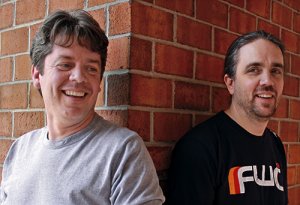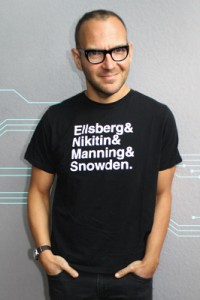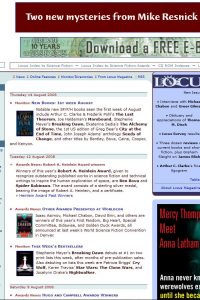James S.A. Corey: Lurid Tales of Space Adventure

James S.A. Corey is the pseudonym for collaborators Daniel Abraham & Ty Franck. (The first and last name are Abraham’s and Franck’s middle names, respectively, and the middle initials are those of Abraham’s daughter.) Together they write the Expanse SF series: Hugo Award finalist Leviathan Wakes (2011), Caliban’s War (2012), and the forthcoming Abaddon’s Gate, with a further three books to follow. They are also writing a forthcoming Star Wars novel about iconic character Han Solo.
Daniel James Abraham was born November 14, 1969 in Albuquerque NM and attended University of New Mexico, where he earned a degree in biology. After graduating in 1996, he spent a few months in New York working at a bookstore, then returned to New Mexico and spent ten years in tech support. He now writes full time.
Abraham’s first story sale was ‘‘Mixing Rebecca’’ in 1996, followed by sales to various magazines and anthologies. Notable stories include Nebula finalist and International Horror Guild Award winner ‘‘Flat Diane’’ (2004) and World Fantasy and Hugo Award finalist ‘‘The Cambist and Lord Iron: A Fairytale of Economics’’ (2007). Some of his short work has been collected in Leviathan Wept and Other Stories (2010). Novella ‘‘Shadow Twin’’ (2004), written with George R.R. Martin & Gardner Dozois, formed the basis for novel Hunter’s Run (2008).
Abraham’s debut novel was A Shadow in Summer (2006), first in the Long Price fantasy quartet, which also includes A Betrayal in Summer (2007), An Autumn War (2008), and The Price of Spring (2009)
As M.L.N. Hanover he writes the Black Sun’s Daughter series: Unclean Spirits (2008), Darker Angels (2009), Vicious Grace (2010), Killing Rites (2011), and the forthcoming Graveyard Child (2013). He wrote six-issue comic book miniseries George R.R. Martin’s Wild Cards: The Hard Call (2008) and is writing the comic adaptation of Martin’s A Game of Thrones now.
Abraham’s most recent work under his own name is the Dagger and the Coin series: The Dragon’s Path (2011), The King’s Blood (2012), and the forthcoming The Tyrant’s Law (2013), with two more volumes planned.
Abraham lives in Albuquerque with wife Katherine Abraham (married 2002) and their daughter Scarlet, born 2006.
Tyler Corey Franck was born May 18, 1969 in Portland OR and has spent most of his life in the West and Southwest. He developed the world of the Expanse series as the setting for a roleplaying game. He has broken rocks at a quarry, built masts for sailboats, sold newspaper and radio ads, worked as a reporter, renovated high-rises, served as director of operations for Northgate Computers, and co-founded a financial software consulting firm. For the past several years he has been George R.R. Martin’s personal assistant.
Franck began publishing SF with story ‘‘Audience’’ in Orson Scott Card’s Intergalactic Medicine Show (2006), which qualified him to join professional writing group Critical Mass, where he met Abraham. Franck lives in New Mexico with his wife Jayné.
Excerpts from the interview:
TF: ‘‘When we started writing Leviathan Wakes, Daniel had already written six or seven novels. I’d only done short stories – maybe a dozen all-told, and only two or three of them had ever seen print. But it turns out that Daniel and I had a very similar idea of what the voice should sound like, without ever having talked about it. We ended up on the same really basic levels: what a narrative voice sounds like, what a description looks like.
‘‘I come from a corporate world where you find people who are experts, and you let them be experts. I knew he knew how to structure a novel, how to break it up so you have three acts or five acts. What  he would say to me was, ‘We really need to end this chunk on a big moment, because this is our second act.’ I accepted this as true, because he was a novelist and I wasn’t yet. The other people in our group were real writers. Steve Stirling sells a hundred jillion books a year, George Martin’s a monster seller, and Daniel had already written like six novels. My thought was, ‘If I spend a year doing this and it doesn’t sell, I still spent a year learning how to plot a novel from somebody who’s done it six times. People pay a lot of money for one-week classes. I got to spend a year doing it, and pay nothing for the privilege.
he would say to me was, ‘We really need to end this chunk on a big moment, because this is our second act.’ I accepted this as true, because he was a novelist and I wasn’t yet. The other people in our group were real writers. Steve Stirling sells a hundred jillion books a year, George Martin’s a monster seller, and Daniel had already written like six novels. My thought was, ‘If I spend a year doing this and it doesn’t sell, I still spent a year learning how to plot a novel from somebody who’s done it six times. People pay a lot of money for one-week classes. I got to spend a year doing it, and pay nothing for the privilege.
‘‘I did know what the world looked like, so I would go in and change all Daniel’s descriptions of things, like the kind of technology people were using – ‘No, we don’t have laser guns in this world.’ He didn’t mind. And I learn quickly. I got to see both versions of a chapter: what I had originally sent him, and what he had done. I joke with him now, ‘There’s a little Daniel that lives in the back of my head, and as I’m typing it will tell me to use this word.’ Daniel’s not even there, but the little version in the back of my head is. Also, he’s much more familiar with the universe now, so I rarely have to correct what things look like anymore.’’
DA: ‘‘We started with two different skill sets, and since then they have merged and blurred a little. After Leviathan Wakes, we felt that alternating two characters was fun, but it really trapped us a couple of times. One character was doing really interesting shit, while the other character was sitting around feeling bad about himself. There were a couple of times when we thought, ‘God, if we could just drop this guy out for three chapters and then bring him back – it would be awesome!’ So for the second book, Caliban’s War, we decided we needed four point-of-view characters, and we didn’t always alternate them. Whichever character has the most interesting things going on, that’s the point-of-view character. It really allowed us so much more freedom.
‘‘The first couple of books, we’d be hard-pressed to say who had written which sentence. One of us will do a complete edit, and then the other one will. So just the number of times that eyes have been on the manuscript has really helped.’’
TF: ‘‘Although, oddly enough, for all three books we’ve done now, Daniel has written the first line and I’ve written the last line. I have a terrible time with the first sentence, but I appear to have a good sense of what line to end things on.’’
DA: ‘‘It was originally planned to be three books, but now we’re under contract for six.’’
…
DA: ‘‘The other thing we talked about was telling a scientific adventure story as if it were OK to emotionally invest in that. I think we live in an age of preemptive irony: ‘I’m writing science fiction, but it’s OK because I’m sort of undercutting it.’ Being willing to emotionally invest and treat this seriously – take all the jokes away, put aside all the literary pretensions, and have it just be genuinely fun. If people laugh at us for doing this, we’re not going to worry about that.
‘‘More than a science fiction story, we’re telling an adventure story. Adventure stories have a reputation for immaturity and adolescence, and that is presented as if it were a bad thing: the joy that we all took when we were reading Bester or Arthur Clarke –’’
TF: ‘‘– or the first time we watched Star Wars –’’
DA: ‘‘– when we weren’t sophisticates. Looking back on those kids we were before we became sophisticated and embarrassed by them, cringing a little: ‘I can’t believe we were so stupid!’’’
TF: ‘‘But we were able to embrace what was happening and invest emotionally in the story.’’
DA: ‘‘It’s really hard to do that when you’re 40, because we’re supposed to be all sophisticated and shit.’’
TF: ‘‘Actually, it’s harder to do at 35. At 40, it starts getting easier again. I never stopped, though. When we were writing Leviathan Wakes, people were asking me what Daniel and I were doing, and my joke was, ‘We’re writing lurid tales of space adventure.’ We were writing space-adventure tales, with horrific elements. We took every genre we liked, and just stuck their tropes in because it was fun.’’
…
TF: ‘‘After the first book came out, Daniel and I talked to our editor and said, ‘We know what the last two books look like. If we’re just going to do a trilogy, we need to do those. If we’re not stopping with three, you need to tell us.’ They immediately sent us a contract for three more, and five novellas (for e-books), which I had never seen before. So now there’s going to be a ‘Jimmy Corey’ gig coming up every six months: a novel in the summer, and a novella around November. Those are going to make more sense if you’ve read the other stuff, but our intention is to write (as much as possible) standalone novellas. For his anthology The Edge of Infinity, Jonathan Strahan bought ‘Drive’, an expanded story about Solomon Epstein, the guy who invented the Epstein Drive.’’


 Read the complete interview, and biographical profile, in the
Read the complete interview, and biographical profile, in the 



Pingback:“If someone has a good idea, it’s Leia.” Work on the Corey Han Solo novel has begun!
Great stuff, but I do have a minor niggle: It’s a “A Betrayal in Winter,” not “A Betrayal in Summer”.